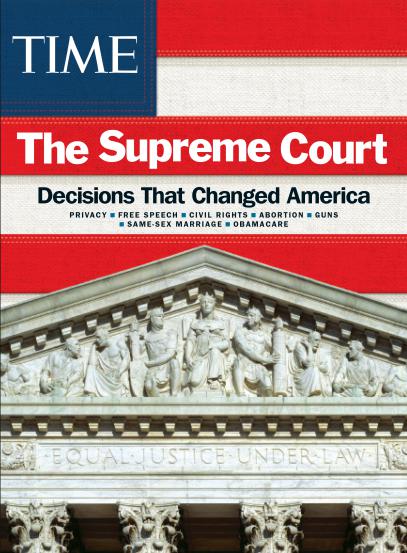Many denizens of powerful and ideologically-uniform institutions disregard the contribution they themselves make to the polarization they deplore.
Time Magazine's Bad Survey of the Worst Supreme Court Decisions
Time asked 16 law professors what they thought were the worst Supreme Court decisions since the 1960s. It is an illuminating enterprise, not because the answers are particularly interesting but because it perfectly illustrates the mindset of the traditional media and the legal academy today.
Begin with Time. While the academy leans about eleven to two to the left, Time managed to exacerbate that disparity, picking only one conservative to participate and what appear to be 15 professors on the left side of the American political spectrum. Then it gave the professors an absurdly small amount of space to explain their reasons—so small that it would be almost impossible to give a reasoned legal critique of any decision. Thus, Time encourages the view that what is important about a decision is whether the result accords with one’s preferences rather than if it is correctly reasoned.
But even given the poor structure for the assignment, the answers are often thoughtless and sometimes wrong even on their own terms. The least favorite decision is Bush v. Gore with five critics. Some argue that it was bad for consequential reasons, because it put the terrible George W. Bush in office and led to the Iraq war. But by now it is well-known that a recount would likely have led to a Bush victory nevertheless, even assuming that Republican House did not decide for Bush. And others proclaim that the result was partisan, although seven justices, including two who were not conservatives, agreed that the Florida Court’s decision violated the equal protection clause. And my friend, Nelson Lund has ably shown why the case was the best reading of the Court’s own Equal Protection Clause jurisprudence and the Florida Supreme Court’s own preferences on the remedy.
Bowers v. Hardwick is another case that comes in for much criticism. While the rhetoric of this case was indeed unfortunate and the law it upheld foolish, its refusal to extend substantive due process was defensible. Indeed, the contrary holding in Lawrence v. Texas was one of the most ill-reasoned decisions in the modern Supreme Court, as Nelson Lund and I explain. We also show why a contrary result cannot be defended simply by arguing that it has good effects:
The Lawrence approach to substantive due process has relatively small and ephemeral benefits but very large and enduring costs, particularly to the judiciary as an institution. This is no accident. The Constitution creates alternative mechanisms for achieving desirable legal changes that are far superior to this kind of judicial improvisation. The ordinary political processes of democracy, and especially the operation of competitive federalism, do not operate flawlessly or instantaneously, but they have numerous advantages over the impatient and self-satisfied imposition of constitutionally unjustified judicial edicts.
And so it has proven. Laws, like those in Bowers, that even at the time were rarely enforced, would be a dead letter today because of social changes, regardless of the result in Lawrence and Bowers.
The other decision most disliked is Citizens United with four critics. Two of the those contributors suggest it does away with democracy, no doubt because they fear the distortion of opinion by corporate expression of views about elections. I have explained elsewhere why this claim misunderstands the Framers’ understanding of democratic representation. But these opponents of Citizens United never give a second thought to the kind of distortions that come from the overwhelmingly politically one-sided views of academics and the news media, which this issue of Time once again confirms. Sadly, the legal academy here comes off as result-oriented, but bad at calculating results, and blind to their own self-interest.


